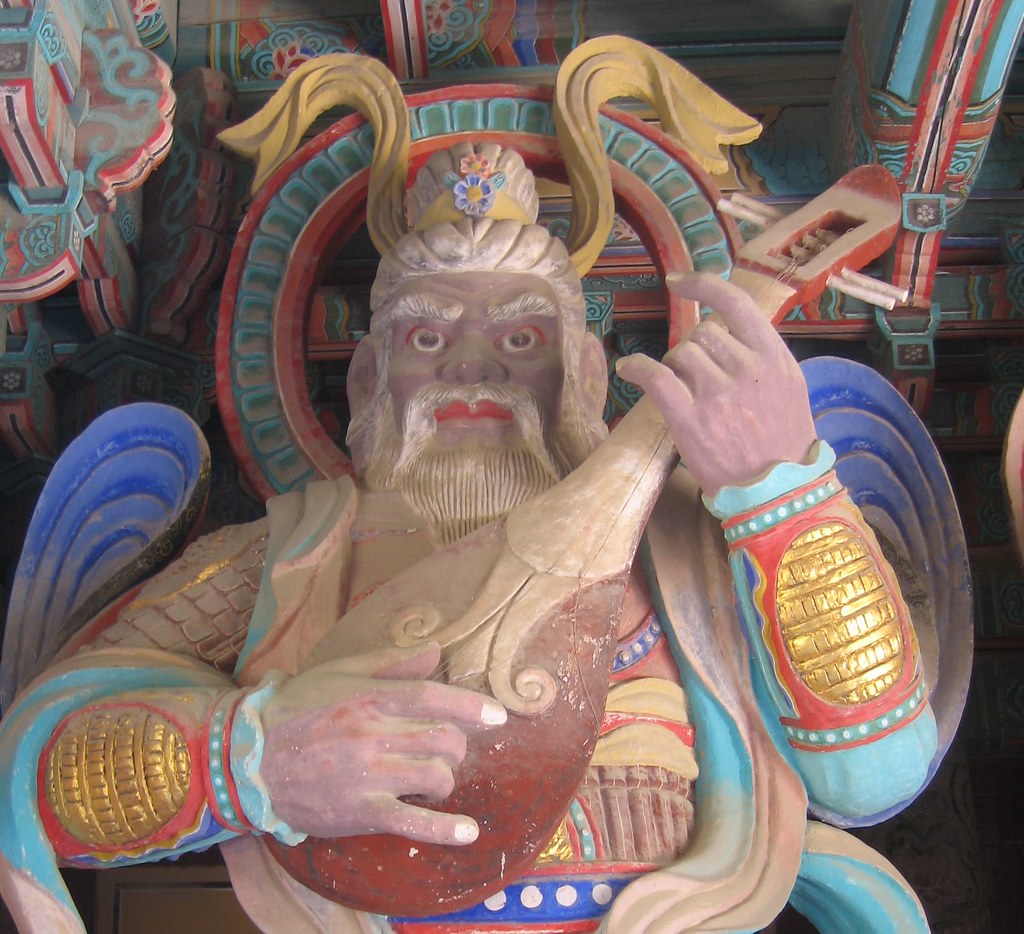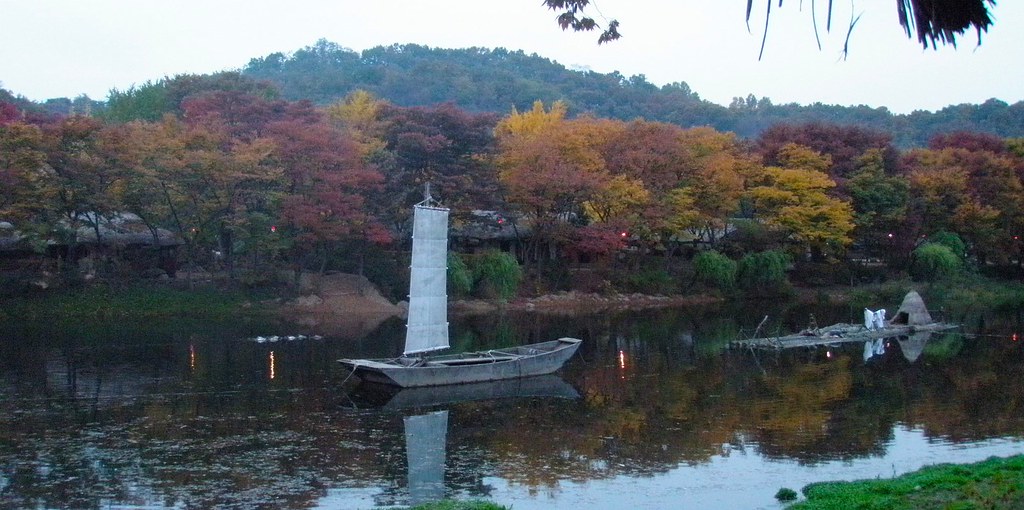My very first inoculation of puerh was 15 years ago on
the Korean island of Jejudo. For those of you who hate cute honeymooning couples in perfectly matching outfits- Jejudo is not for you. My husband and I traveled to Jejudo from Mokpo on a slow ferry filled
with uniformed school girls on an overnight outing. You can imagine the four
hours of non-stop giggling going on above deck and below. Luckily we hid ourselves in the ridiculously cheap and spacious "Luxury Suite".
(These are just pretty pictures from previous trips to Korea, nothing to do with the actual trip which unfortunately predates owning a digital camera...)
I tend to avoid hotels and by chance or luck I ended up booking a home-stay with a most unusual woman who turned out to be a passionate disciple of tea. On our first night, our hostess sat us in her tea room. She said that she had been the happiest woman in the world with a perfect husband and perfect children. Others told her to be careful because fate is jealous of overly happy women. Tears filled her downcast eyes as she told us how her husband unexpectedly passed away of a heart attack while mountain climbing in Peru. Even an average Korean is a cauldron of passion but our hostess was a molten planet of passion. After four hours on the rough seas, we didn't know what to say. Home-stay with a Korean household can be an unimaginably intense experience that I highly recommend a traveler to Korea try it at least once.
Our hostess gave us a most amazing inside tour to Jejudo. On the second night she took us to a local potter's house for dinner- the potter was a serious appreciator of puerh known as boicha in Korea. He actually arranged tea buying trips to China for various Buddhist monasteries as puerh had a following among Korean monks. His house had a shelf full of lovely yixing pots but he also had a playful daughter who would race around the room smashing tiny little pots against each other. Even to my untrained eyes back then they were precious looking and who knows how many she did crack. Apparently she had knocked out a treasured pot just the week before and her father's stern warnings of "those pots are not toys" had zero effect.
 After dinner, the potter brought out a beautiful shiny zhuni clay teapot filled with aged sheng. I really was not ready to appreciate profound teas at that age as I was chasing flavors and mouthfeel of oolongs, whites, and gyokuro senchas back then. To my beginner's palate, I could tell this aged pu-erh had a great clarity, depth, and complexity yet I could not appreciate the taste. I tried to drink it as slowly as possible as my then sugar junkie brain kept translating it as a medicinal/herbal taste. I didn't know anything about the fortitude of puerh leaves and I kept expecting the tea to end after a few brews. The magical pot to my ignorant dismay lasted hours. Hours! Oh how kick myself remembering the travesty of my unschooled tastebuds.
After dinner, the potter brought out a beautiful shiny zhuni clay teapot filled with aged sheng. I really was not ready to appreciate profound teas at that age as I was chasing flavors and mouthfeel of oolongs, whites, and gyokuro senchas back then. To my beginner's palate, I could tell this aged pu-erh had a great clarity, depth, and complexity yet I could not appreciate the taste. I tried to drink it as slowly as possible as my then sugar junkie brain kept translating it as a medicinal/herbal taste. I didn't know anything about the fortitude of puerh leaves and I kept expecting the tea to end after a few brews. The magical pot to my ignorant dismay lasted hours. Hours! Oh how kick myself remembering the travesty of my unschooled tastebuds.
The next day our hostess took us to see a Buddhist monk with whom she studied. He said we needed tea and then smiling at us as if he were providing a special treat, he whipped out an aged sheng. I remember my young uncouth self thinking then, "Oh no! Not more medicine tea!" I really kick myself for not being able to see into the future. Neither teas tasted wet stored nor did they exhibit any hints of bitterness or dryness; they were smooth yet deep, their effect was gentle and warming on the body. It was only at the Pasadena tasting of the six decades of tea that my husband and I realized we were served some serious quality aged sheng all those years back in Jejudo.
This first exposure set what I think as being good aged sheng, but most importantly it set my puerh karma. The best teas have only come to me not through purchase but through friendship and other means. After a certain point, one will hit a wall with just internet puerh buying. I've already hit that wall multiple times but I still keep hoping to simply by myself into good puerh. (The budget ebay experiment was for curiosity more than anything else.) I think I should just give it up now; I should not force my way in.
(These are just pretty pictures from previous trips to Korea, nothing to do with the actual trip which unfortunately predates owning a digital camera...)
I tend to avoid hotels and by chance or luck I ended up booking a home-stay with a most unusual woman who turned out to be a passionate disciple of tea. On our first night, our hostess sat us in her tea room. She said that she had been the happiest woman in the world with a perfect husband and perfect children. Others told her to be careful because fate is jealous of overly happy women. Tears filled her downcast eyes as she told us how her husband unexpectedly passed away of a heart attack while mountain climbing in Peru. Even an average Korean is a cauldron of passion but our hostess was a molten planet of passion. After four hours on the rough seas, we didn't know what to say. Home-stay with a Korean household can be an unimaginably intense experience that I highly recommend a traveler to Korea try it at least once.
Our hostess gave us a most amazing inside tour to Jejudo. On the second night she took us to a local potter's house for dinner- the potter was a serious appreciator of puerh known as boicha in Korea. He actually arranged tea buying trips to China for various Buddhist monasteries as puerh had a following among Korean monks. His house had a shelf full of lovely yixing pots but he also had a playful daughter who would race around the room smashing tiny little pots against each other. Even to my untrained eyes back then they were precious looking and who knows how many she did crack. Apparently she had knocked out a treasured pot just the week before and her father's stern warnings of "those pots are not toys" had zero effect.
 After dinner, the potter brought out a beautiful shiny zhuni clay teapot filled with aged sheng. I really was not ready to appreciate profound teas at that age as I was chasing flavors and mouthfeel of oolongs, whites, and gyokuro senchas back then. To my beginner's palate, I could tell this aged pu-erh had a great clarity, depth, and complexity yet I could not appreciate the taste. I tried to drink it as slowly as possible as my then sugar junkie brain kept translating it as a medicinal/herbal taste. I didn't know anything about the fortitude of puerh leaves and I kept expecting the tea to end after a few brews. The magical pot to my ignorant dismay lasted hours. Hours! Oh how kick myself remembering the travesty of my unschooled tastebuds.
After dinner, the potter brought out a beautiful shiny zhuni clay teapot filled with aged sheng. I really was not ready to appreciate profound teas at that age as I was chasing flavors and mouthfeel of oolongs, whites, and gyokuro senchas back then. To my beginner's palate, I could tell this aged pu-erh had a great clarity, depth, and complexity yet I could not appreciate the taste. I tried to drink it as slowly as possible as my then sugar junkie brain kept translating it as a medicinal/herbal taste. I didn't know anything about the fortitude of puerh leaves and I kept expecting the tea to end after a few brews. The magical pot to my ignorant dismay lasted hours. Hours! Oh how kick myself remembering the travesty of my unschooled tastebuds.The next day our hostess took us to see a Buddhist monk with whom she studied. He said we needed tea and then smiling at us as if he were providing a special treat, he whipped out an aged sheng. I remember my young uncouth self thinking then, "Oh no! Not more medicine tea!" I really kick myself for not being able to see into the future. Neither teas tasted wet stored nor did they exhibit any hints of bitterness or dryness; they were smooth yet deep, their effect was gentle and warming on the body. It was only at the Pasadena tasting of the six decades of tea that my husband and I realized we were served some serious quality aged sheng all those years back in Jejudo.
This first exposure set what I think as being good aged sheng, but most importantly it set my puerh karma. The best teas have only come to me not through purchase but through friendship and other means. After a certain point, one will hit a wall with just internet puerh buying. I've already hit that wall multiple times but I still keep hoping to simply by myself into good puerh. (The budget ebay experiment was for curiosity more than anything else.) I think I should just give it up now; I should not force my way in.

No comments:
Post a Comment